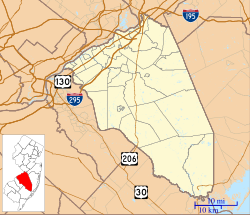Batsto Village, New Jersey
| Batsto Village, New Jersey | |
|---|---|
| Unincorporated community | |

Batsto River flowing through Batsto Village
|
|
| Location of Batsto Village in Burlington County (Inset: Location of county within the state of New Jersey) | |
| Coordinates: 39°38′30″N 74°38′52″W / 39.64167°N 74.64778°WCoordinates: 39°38′30″N 74°38′52″W / 39.64167°N 74.64778°W | |
| Country |
|
| State |
|
| County | Burlington |
| Township | Washington |
| Elevation | 13 ft (4 m) |
| Time zone | Eastern (EST) (UTC-5) |
| • Summer (DST) | EDT (UTC-4) |
| GNIS feature ID | 874539 |
|
Batsto Village
|
|
| Location | 10 mi. E of Hammonton on CR 542, Batsto, New Jersey |
|---|---|
| Area | 1,200 acres (490 ha) |
| Built | 1687 |
| Architect | Joseph Wharton |
| Architectural style | Late Victorian |
| NRHP Reference # | 71000495 |
| Added to NRHP | September 10, 1971 |
Batsto Village (or simply Batsto) is an historic unincorporated community located on County Route 542 within Washington Township in Burlington County, New Jersey, United States. It is located in Wharton State Forest in the south central Pine Barrens, and a part of the Pinelands National Reserve. It is listed on the New Jersey and National Register of Historic Places, and is administered by the New Jersey Department of Environmental Protection's Division of Parks & Forestry. The name is derived from the Swedish bastu, bathing place (also the Swedish word for Finnish sauna); the first bathers were probably the Lenni Lenape Native Americans.
In 1766, Charles Read, a well-known ironmaster, built the Batsto Iron Works along the Batsto River on the site of the future village. The area had an abundance of bog ore which could be mined from the area's streams and rivers, and wood from the area's forests was harvested for charcoal for smelting the ore. The rivers, despite their modest drop, were also harnessed for iron making.
In 1773, John Cox bought the Iron Works, which produced cooking pots, kettles, and other household items. Batsto manufactured supplies for the Continental Army during the American Revolutionary War.
...
Wikipedia



